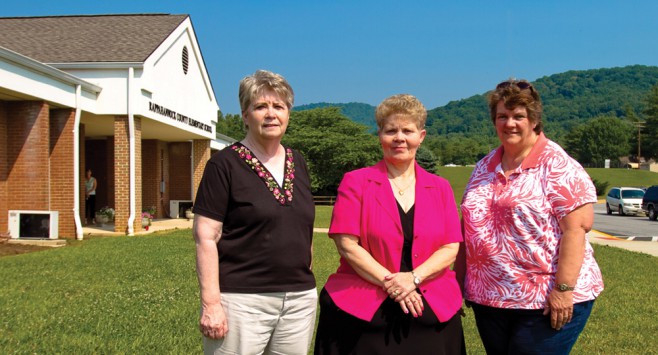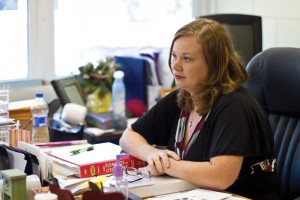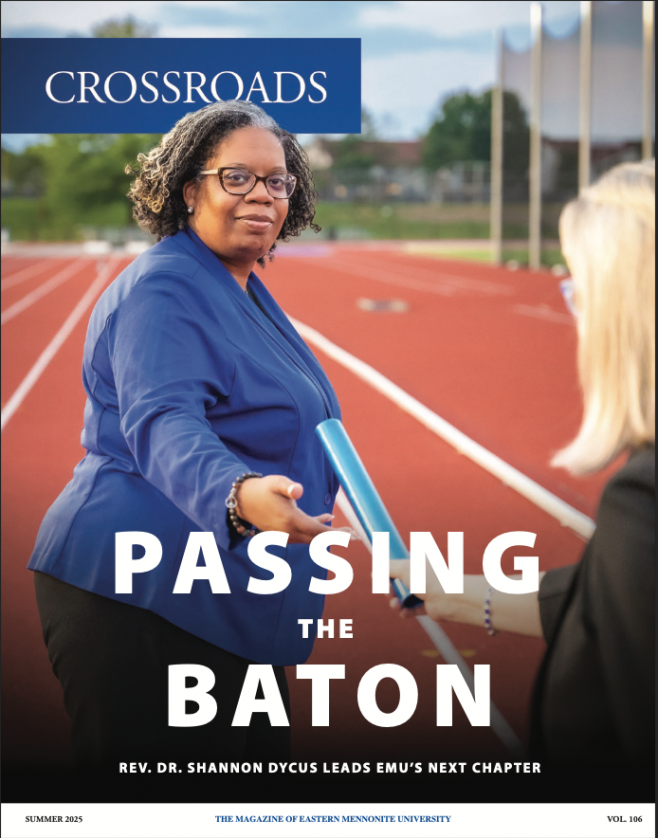
Joyce Wharton '05, Linda Welk '05 and Ginger Estes '08 drove over an hour each way from their homes in Rappahannock County to classes in Harrisonburg.
Once a week, as soon as Ginger Estes ’08 had finished her route and parked the school bus at 4:30 in the afternoon, she’d hop straight into her own car for the 50- mile, twisting drive over two mountain ranges to Harrisonburg from her home in Rappahannock County, Virginia. Rain, shine or snow, she made it to her ADCP classes every week for 15 months, graduating with a bachelor’s degree in 2008.
“I wouldn’t have been able to [earn my degree] if it wasn’t for this program. We had been out of school for almost 20 years,” said Estes, gesturing at her colleagues Joyce Wharton ’05 and Linda Welk ’05 seated beside her in a classroom at Rappahannock County Elementary School.
The three women all worked in the county school system before and during their undergraduate studies at ADCP: Welk and Wharton were substitute teachers, and Estes was a bus driver and aide. Since graduating from the program, however, they’ve all become teachers within the same school division, earning significantly higher salaries.
Wharton now teaches fifth grade, while Welk and Estes are both special education teachers. (Wharton’s and Estes’ working lives together go back considerably farther, to when they were both employed at Aileen, a textile plant in Rappahannock County that shut down in the mid-nineties.)
A fourth Rappahannock County school employee, Pat Lawler ’05, is also an ADCP graduate, now working as a special education instructional aide, and together, the group is encouraging various other colleagues to consider the program.
“There was such a diverse group of people [at EMU],” said Wharton, who enjoyed the encouragement and energy provided by younger classmates in her ADCP cohort.
As part of their final projects for their degrees at EMU, the three women completed research projects related to their interest in teaching: Wharton looked at substitute teaching, Estes researched special education teaching strategies, and Welk finished a project on a technique called “mastery learning” that attracted the interest of administrators at the school. All three women said the program’s flexibility, and the instructors’ respect for the demands of full-time jobs and family obligations, were key to their success.

Brandy Jenkins '07 went from working in a bank to her dream job of schoolteaching, boosted by ADCP.
“[ADCP] is a really good opportunity for people who have to work while they’re taking classes,” said Brandy Jenkins ’07, an eighth grade English teacher at Page County Middle School, where she is 20 minutes closer to Harrisonburg than the Rappahannock teachers – she had just one mountain range to cross to get to EMU.
Though Jenkins had worked at a bank rather than in the school system while she earned her degree from EMU, like Estes, Welk and Wharton, she went on to a career in teaching after graduation. Jenkins said she’d always been drawn to education, even while she worked in the business world. “I took the long and winding road to reach my destination.”
Jenkins, who began a family and worked full-time during her transition to teaching, said the structure of ADCP, designed for working adults, was also ideal for her.
“The flexibility of the program made it possible for my life to continue while I finished my degree,” she said.
While these graduates of ADCP finished with bachelor’s degrees in management and organizational development, all of them required further certification to become licensed teachers in Virginia. Jenkins completed licensure at Shenandoah University in Winchester, Virginia, while Welk and Wharton were licensed through a program offered by the Virginia Department of Education. Estes is currently finishing her licensure requirements through an online program of Old Dominion University in Norfolk, Virginia.
And now, looking back, all of them – Estes, Welk, Wharton and Jenkins – say the late nights and long drives were worth it.
“I was the epitome of a non-traditional student,” said Jenkins, who grew up in Page County and once took ninth grade science in the very classroom she now teaches in. “Even though I took the long and winding road to reach my destination, I would do it all again exactly the same way.”
